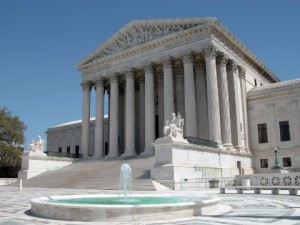
Justice Anthony Kennedy
The underlying question before the Supreme Court in United States v. Windsor–which challenged the federal Defense of Marriage Act–was: Does the Constitution forbid the U.S. Congress from defining the words “marriage” and “spouse” as they have always been defined in the English language?
And that leads unavoidably to a deeper question: Can American law be rooted in morality?
The court’s ruling in this case did not so much promote a new form of marriage as enforce a radical form of divorce—one that sunders American law from the natural law upon which our nation was founded.
In the 1986 case of Bowers v. Hardwick, Justice Byron White—appointed to the court by Democratic President John F. Kennedy—wrote that Georgia had a right to base its anti-sodomy law on traditional morality.
“Even if the conduct at issue here is not a fundamental right, respondent asserts that there must be a rational basis for the law, and that there is none in this case other than the presumed belief of a majority of the electorate in Georgia that homosexual sodomy is immoral and unacceptable,” wrote White. “This is said to be an inadequate rationale to support the law. The law, however, is constantly based on notions of morality, and if all laws representing essentially moral choices are to be invalidated under the Due Process Clause, the courts will be very busy indeed.”
Chief Justice Warren Burger concurred. “Condemnation of those practices is firmly rooted in Judeo-Christian moral and ethical standards,” he wrote. “To hold that the act of homosexual sodomy is somehow protected as a fundamental right would be to cast aside millennia of moral teaching.”
The court would do just that in the 2003 case of Lawrence v. Texas. There the court declared unconstitutional a Texas law banning same-sex sodomy. Justice Anthony Kennedy, writing for the court, attacked the argument White and Burger had made in Bowers.
“The sweeping references by Chief Justice Burger to the history of Western civilization and to Judeo-Christian moral and ethical standards did not take account of other authorities pointing in an opposite direction,” wrote Justice Kennedy.
What authorities were these that Kennedy held up against White’s and Burger’s defense of the Judeo-Christian moral tradition and Western Civilization?
“A committee advising the British Parliament recommended in 1957 repeal of laws punishing homosexual conduct,” said Kennedy. “Parliament enacted the substance of those recommendations 10 years later.”
Dissenting in Lawrence, Justice Antonin Scalia pointed out that if the court was going to insist that states could not enact laws based on morality then the laws prohibiting sodomy were not the only ones it would need to overturn.
“State laws against bigamy, same-sex marriage, adult incest, prostitution, masturbation, adultery, fornication, bestiality, and obscenity are likewise sustainable only in light of Bowers’ validation of laws based on moral choices,” wrote Scalia. “Every single one of these laws is called into question by today’s decision; the Court makes no effort to cabin the scope of its decision to exclude them from its holding.”

The warnings issued by Justice White in Bowers and Justice Scalia in Lawrence are being realized.
Could a singular state legislature and five justices now force the federal government to declare that the word “marriage” also means the legal union of one man and four women? Or that a “spouse” is any one of the multiple people in a polygamous relationship?
Nothing in the court’s logic in Windsor would seem to prevent this.
Section 3 of the Defense of Marriage Act signed by President Clinton in 1996 said: “In determining the meaning of any Act of Congress, or of any ruling, regulation, or interpretation of the various administrative bureaus and agencies of the United States, the word ‘marriage’ means only a legal union between one man and one woman as husband and wife, and the word ‘spouse’ refers only to a person of the opposite sex who is a husband or a wife.”
In Windsor, a lesbian from New York–backed up by the Obama administration which refused to enforce Section 3 of DOMA–argued that it was unconstitutional for Congress to say that for federal purposes “marriage” means “a legal union between one man and one woman,” and that “spouse” means “a person of the opposite sex who is a husband or a wife.”
Justice Kennedy, once again writing for the court, said: “Slowly at first and then in rapid course, the laws of New York came to acknowledge the urgency of this issue for same-sex couples who wanted to affirm their commitment to one another before their children, their family, their friends, and their community. And so New York recognized same-sex marriages performed elsewhere; and then it later amended its own marriage laws to permit same-sex marriage.”
Kennedy then concluded that when Congress defined marriage as between one man and one woman it violated the due process of law guaranteed by the Fifth Amendment because the federal government would not treat same-sex “married” couples from New York the same as male-female “married” couples from New York or anywhere else.
“This requires the Court to hold, as it now does, that DOMA is unconstitutional as a deprivation of the liberty of the person protected by the Fifth Amendment of the Constitution,” wrote Kennedy.
So, what happens now if a state legalizes polygamy? Would it not, in Kennedy’s view, be a violation of due process for the federal government not to recognize that “marriage?”
In the Declaration of Independence, the Founding Fathers appealed to “the Laws of Nature and Nature’s God” and affirmed their belief that all men “are endowed by their Creator with certain unalienable Rights.”
In the 1970s, the Supreme Court violated this principle, and the meaning of the Constitution, by declaring a “right” to kill an unborn child.
Now, in its latest decision, the court did not merely affirm a new form of marriage, it confirmed a divorce—the one it has ordered between contemporary American law and this nation’s founding principles that our rights come from God and that the state itself must obey His natural law.
Source material can be found at this site.









